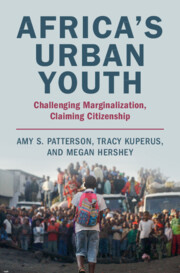Book contents
- Africa’s Urban Youth
- Africa’s Urban Youth
- Copyright page
- Dedication
- Contents
- Figures
- Tables
- Acknowledgments
- Abbreviations
- Introduction
- 1 Theorizing Urban Youth and Everyday Citizenship
- 2 Manifesting Citizenship through Local and Distinct Actions
- 3 Engaging the State
- 4 Confronting Economic Marginalization
- 5 Contesting Citizenship through Religious Identity
- 6 Affirming and Challenging Patriarchy
- 7 Channeling Frustration through Exit, Exclusion, and Engagement
- Conclusion
- Book part
- References
- Index
4 - Confronting Economic Marginalization
Published online by Cambridge University Press: 10 August 2023
- Africa’s Urban Youth
- Africa’s Urban Youth
- Copyright page
- Dedication
- Contents
- Figures
- Tables
- Acknowledgments
- Abbreviations
- Introduction
- 1 Theorizing Urban Youth and Everyday Citizenship
- 2 Manifesting Citizenship through Local and Distinct Actions
- 3 Engaging the State
- 4 Confronting Economic Marginalization
- 5 Contesting Citizenship through Religious Identity
- 6 Affirming and Challenging Patriarchy
- 7 Channeling Frustration through Exit, Exclusion, and Engagement
- Conclusion
- Book part
- References
- Index
Summary
The chapter investigates how youth respondents of higher- and lower-income levels negotiate and contest everyday citizenship. In examining citizenship-from-below, the economic precarity that lower-income respondents face leads them to stress citizen actions that foster reliance on others and collective activities. In contrast, higher-income youth stress productivity and self-reliance as citizenship components, and survey findings reveal their limited engagement in community groups (except in Uganda). Upon examining acts of citizenship-from-above such as paying taxes, higher-income youth are more concerned about the legal compliance of others, while lower-income youth are more concerned about being accused of legal violations. Surveys indicate more lower-income youth vote in Ghana and Uganda, but income differences on other acts of state-targeted participation are negligible. Our respondents do not explicitly link income or poverty to political engagement, but Tanzania and Zambia case studies demonstrate that paternalism, derision, and envy within and across income groups can shape citizenship identities.
Keywords
- Type
- Chapter
- Information
- Africa's Urban YouthChallenging Marginalization, Claiming Citizenship, pp. 91 - 117Publisher: Cambridge University PressPrint publication year: 2023



